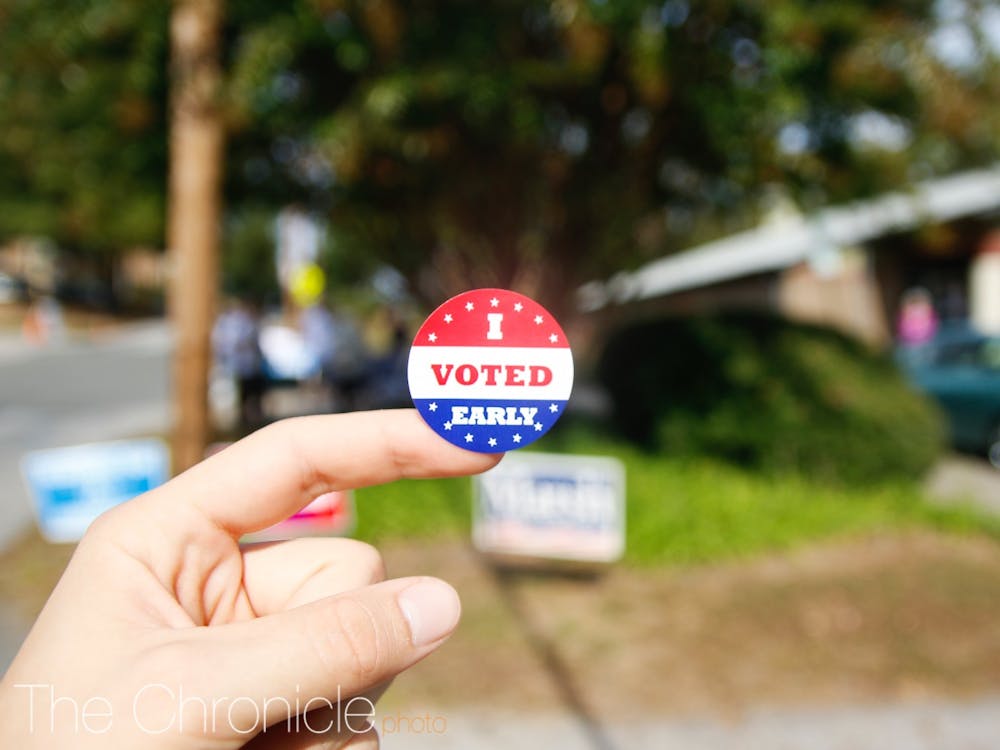The United States has always struggled with the issue of fair and free elections and the question of who gets to participate in them, and a new book looks at that history in Duke’s home state.
The book “Fragile Democracy: The Struggle Over Race and Voting Rights in North Carolina” by James Leloudis and Robert Korstad, examines the history of fair elections in North Carolina, which has historically been a battleground for voting rights.
The two authors discussed their book at a Wednesday event co-sponsored by the POLIS: Center for Politics, the Hart Leadership Program and the Sanford School of Public Policy. The event was moderated by Deondra Rose, assistant professor of public policy and political science and the director of research for POLIS.
During their planned remarks, Leloudis, a professor of history at the University of North Carolina at Chapel Hill, said that the pair wrote “a book about the past that has its origins in the concerns of the present day.” The book is based on research done by the pair for their expert testimony in two North Carolina court cases regarding the election laws H.B. 589 and S.B. 824.
H.B. 589, which passed in 2013, restricted early voting, eliminated out-of-precinct voting and required voters to show specific forms of identification. Federal courts eventually overturned most of the law upon findings that the state General Assembly “targeted African-American voters with surgical precision.”
S.B. 824, which passed the legislature this year, attempted to instate a photo ID requirement for voting. That bill will affect this November’s general election and Gov. Roy Cooper has pushed for it to be struck down in federal court.
Leloudis discussed the goals of the voting rights struggle, as “blacks and their white allies formed political alliances to… lay claim to their rights of equal citizenship.”
He said that their aim was “not only to advance their own interests but to promote participatory democracy and make government more responsive to the needs of all its people.” He noted that “white supremacy had to be made and remade every day” in its means of oppression, because “even in the depths of Jim Crow segregation, Black North Carolinians refused to surrender their claim on equal citizenship.”
Korstad, a professor emeritus of history and public policy at Sanford, discussed the modern continuance of the struggle for voting rights, starting with the Voting Rights Act of 1965. By 1989, he said, Black representation in the North Carolina General Assembly had returned to pre-Jim Crow levels, and Black representatives had formed progressive alliances with white allies.
“The 1990s and 2000s reimagined the role that state governments would play in providing economic opportunity and security for all North Carolina citizens,” Korstad said.
He said that the conservative reaction to this progress included the gutting of the Voting Rights Act through the U.S. Supreme Court and state-level legislation, and the scaling back of economic policies designed to provide equal opportunity to low income communities of color.
In response to an audience question about the implications of the changing composition of the U.S. Supreme Court, Leloudis said that the court “has already done a significant amount of damage with Citizens United and turning back the Voting Rights Act.”
He said that Democrats regaining control of Congress and the presidency could have important implications for re-enshrining the VRA.
“Another huge fight will be gerrymandering, which is not new, but new technical capacities allow it to be taken to an extreme,” Korstad said.
Another audience question asked about the change in the way undergraduate students think about memorializing historical figures who were racist.
Leloudis lauded students for leading the movement to hold historical figures accountable without making excuses for them, while Korstad noted that there’s still a lot of work to be done to push the boundaries of the education system. He said that students shouldn’t have to wait until they’re undergraduates in college to learn about and reckon with historical racial injustice.
When asked about the authors’ goals in writing the book, as well what they hope to achieve in context of the current political and historical moment, Leloudis said “history can have an extraordinary clarifying power,” explaining how critiques of the current voting rights situation are made much more powerful when placed in a historical context.
Korstad added that historical context disproves the narrative that excuses white supremacists for acting in accordance with popular sentiment.
“These issues have been contested in North Carolina for [centuries]. Leaders of white supremacy campaigns have always faced lots of opposition,” he said.
Get The Chronicle straight to your inbox
Sign up for our weekly newsletter. Cancel at any time.
Anisha Reddy is a Trinity junior and a senior editor of The Chronicle's 118th volume.

